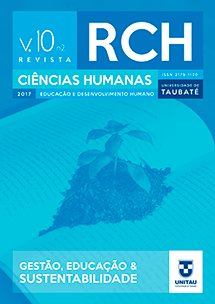DESTINO DO RESÍDUO ORGÂNICO DO LAR ESCOLA SANTA VERÔNICA: como tornar restos alimentares em adubo orgânico através da técnica de compostagem
DOI:
https://doi.org/10.32813/rchv10n22017artigo3Keywords:
Resíduo Orgânico, Compostagem, Educação Ambiental.Abstract
O presente artigo irá apresentar a compostagem como estratégia ecológica no tratamento de resíduos orgânicos do Lar Escola Santa Verônica, situada no município de Taubaté-SP. Tendo como tema gerador a grande produção de restos alimentares da instituição, e o destino final o aterro sanitário, uma vez que sua capacidade é finita. Foi proposto uma solução no tratamento dos resíduos orgânicos, através da compostagem. Essa técnica é capaz de trazer benefícios em nível de economia e de enriquecimento do produto final que retornará ao meio ambiente. Utilizou-se a metodologia de aprendizagem baseado em problemas (PBL). Foram realizados 8 encontros, onde participaram pesquisadores e alunos. Nesses encontros foram abordadas as questões ambientais, qualidade de vida e matemáticas pertinentes as questões de unidade e medida para a construção das composteiras. O estudo permitiu a produção de composto orgânico, evitando-se significativamente a destinação de resíduos ao aterro sanitário. Acredita- se que com ações educativas, pesquisa e projetos relacionados a sustentabilidade e educação ambiental, a compostagem contribuiu para o desenvolvimento de práticas sustentáveis e ecologicamente corretas.
Metrics
References
Almeida, C.; Teixeira, F.; Silva, M. Centro de Demonstração de compostagem: educação para o tratamento de resíduos orgânicos in loco. VII Congresso Nacional de Engenharia do Ambiente. Lisboa. Disponível em: <http://repositorio.ucp.pt/handle/10400.14/6952> Acesso em: 20 mar. 2017.
Compostagem Caseira. Disponível em: www.revistaecologico.com.br. Acesso em: 17 mar. 2017.
DEMO, P. Metodologia científica em ciências sociais. 2 ed., São Paulo: Atlas, 1992.
FINSTEIN, M. S. (Ed.). Composting: theory and practice for city, industry and farm. [S.l]: Ed. J. G. Press, 1982. p.150-157.
FREIRE, P. Pedagogia da autonomia: saberes necessários à pratica educativa. São Paulo: Paz e Terra, 2002
GIL, Antônio Carlos. Como elaborar projetos de pesquisa: Ed. São Paulo. Atlas, 1991.
Hamerschmidt, I.; Oliveira, S. Alimentação saudável e sustentabilidade ambiental nas escolas do Paraná. Curitiba: Instituto Emater, 2014.
Becker, Fernando, O Que é Construtivismo? Disponível em: http://www.crmariocovas.sp.gov.br. Acesso em: 04 mai.2017
NETO, J.T. Manual de compostagem: processo de baixo custo. Viçosa, MG. Editora UFV, 2005.
PEREIRA NETO J. T.; Manual de compostagem: processo de baixo custo. UFV. 2007
Pereira, M. S. et al. Compostagem na escola. 1º anais do programa Ciência na Escola. Disponível em: < http://gpaaa.inpa.gov.br/index.php/RCE/article/viewFile/ 145/28>. Acesso em: 20 mar. 2017.
SOUZA, F.A.de; AQUINO, A.M. de; RICCI, M.dos S.F.; FEIDEN, A. Compostagem. Seropédida: Empresa Brasileira de PesquisaAgropecuária - Embrapa Agrobiologia, 11 p.,2001 (Boletim Técnico, nº 50).
TEIXEIRA, L.B. et al. Processo de compostagem, a partir de lixo orgânico
urbano, em leira estática com ventilação natural. Belém: Embrapa, 2004, 8 p. (Circular Técnica, 33) .Wangen & FreitasRev. Bras.
PEREIRA NETO, João Tinoco. Manual de Compostasgem: processo de baixo custo. Belo Horizonte: UNICEF, 1996. 56 P.
Downloads
Published
How to Cite
Issue
Section
License
The publications of the Human Sciences Journal are registered under the Creative Commons Attribution CC-BY license.
1. The contents of the manuscripts are the exclusive responsibility of their author.
2. It is allowed the total or partial reproduction of manuscripts published in the journal, provided that the source is cited.
3. When submitting their manuscript to the Journal, the authors certify that they are of their own authorship and unpublished (not published in any digital or printed media).
4. The copyright of the articles published in the Journal are of the author, with first publication rights reserved for this journal.
5. For disclosure purposes, the Journal may replicate the works published in this journal in other media, such as social networks (Facebook, Academia.Edu, etc.).
6. The Journal is of public access, therefore, the authors who submit manuscripts agree that they are of free use.
7. In case of any illegality, fraud, or other attitude that puts in doubt the honesty of the publication, especially the practice of plagiarism, the manuscript will be automatically rejected.
8. If the manuscript has already been published, it will be immediately removed from the base of the Journal, its citation linked to the Journal will be prohibited and the cancellation of the referred publication shall be reported in the next issue of the one in which the article was published. In case of the procedure for the withdrawal of the paper the authors will be informed beforehand, being guaranteed the right to a broad defense.
9. The personal data provided by the authors will be used exclusively for the services provided by this publication and will not be made available for other purposes or to third parties.





